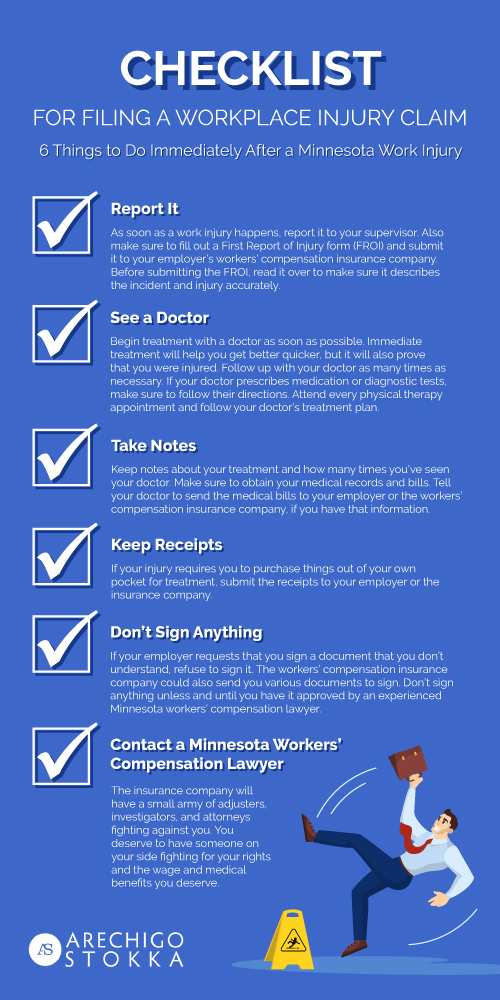
One of the key ideas behind workers’ compensation law is that the employer provides a benefit to an employee that covers any on-the-job injury.
This benefit is provided regardless of what that injury is and without having to determine who is at fault.
Despite this, there are real limits in Minnesota law behind the type of injury and how the injury occurred which affect the benefits you receive.
Below, the experienced Minnesota workers’ compensation lawyers at Arechigo & Stokka will go over what happens if you are injured at work in Minnesota.
If you have questions about your worker’s comp claim, contact our St. Paul workers’ compensation attorney today.
For example, benefits can be denied when an employee suffers an injury while engaging in illegal activity or if the injury is self-inflicted.
If the injury occurred while the employee was under the influence of drugs or alcohol, then it will not be covered.
An employee may also not be covered if they were engaging in restricted activity at the time of injury.
However, there are many injuries that workplace accidents insurance covers. They can happen on or off the employer’s property.
Have you been injured on the job?
Minnesota workers’ compensation benefits may help you pay your living expenses, and provide you with the medical care and vocational services that you need.
For assistance, please send us a message or call (651) 222-6603 today.
Understanding the Types of Workplace Injuries
An injury incurred on the job is not considered a valid injury for workers’ compensation purposes if it:
- Occurred due to committing a crime;
- Did not occur while on the clock;
- Was self-inflicted;
- Was caused by a pre-existing condition (unless worsened by current work); or
- Resulted from the use of alcohol or drugs.
An injury may also not be covered by workers’ compensation if it is determined that the injury occurred due to a violation of workplace policy.
Injuries covered under Minnesota workers’ compensation law include physical injuries such as broken bones, head injuries, spinal injuries, amputated limbs, paralysis, eye injuries, burn injuries, and repetitive motion injuries (carpal tunnel).
Illnesses also are covered if the illness suffered is caused by any hazardous workplace condition.
For example, exposure to a toxic substance, and exposure to substances that can cause cancer or respiratory illnesses usually trigger Minnesota workers’ compensation benefits.
Mental illnesses or traumatic emotional experiences at work are tricky.
Workers’ compensation claims in these areas have gained some recent momentum in Minnesota.
For example, a person who experiences an event at work that causes emotional trauma resulting in post-traumatic stress disorder (PTSD) could possibly qualify for Minnesota workers’ compensation benefits.
These benefits are only given if it is deemed impossible for a person to return to work or a person can only work in a limited capacity because of the traumatic experience.
Recent Case Settlement
THE CASE: We recently settled a case after an employee’s fingers were severed while working.
The Employer claimed that the Employee was an independent contractor, and was not entitled to workers’ compensation benefits. The Employer was not insured.
If that claim prevailed, the Employee would have been responsible for his substantial medical bills, as well not being able to work for one year with no compensation.
CASE RESULT: We filed a Claim Petition in his case alleging that he was not an independent contractor.
Despite not receiving the initial benefits he should have been entitled to, we settled his case. All of the medical bills were paid, and the case was settled for an additional $75,000.


